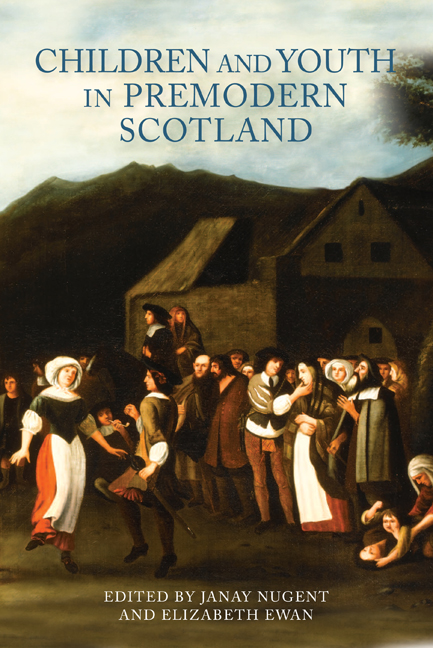Book contents
- Frontmatter
- Dedication
- Contents
- List of Illustrations
- Notes on Contributors
- Acknowledgments
- Abbreviations and Conventions
- Introduction: Adding Age and Generation as a Category of Historical Analysis
- Part I Experiences of Childhood and Youth
- Part II Representations of the Young
- Part III Constructing the Next Generation
- Envoi In Their Own Words: A Mother to Her Son
- Guide to Further Reading
- Index
- St Andrew Studies in Scottish History
Introduction: Adding Age and Generation as a Category of Historical Analysis
Published online by Cambridge University Press: 11 May 2021
- Frontmatter
- Dedication
- Contents
- List of Illustrations
- Notes on Contributors
- Acknowledgments
- Abbreviations and Conventions
- Introduction: Adding Age and Generation as a Category of Historical Analysis
- Part I Experiences of Childhood and Youth
- Part II Representations of the Young
- Part III Constructing the Next Generation
- Envoi In Their Own Words: A Mother to Her Son
- Guide to Further Reading
- Index
- St Andrew Studies in Scottish History
Summary
Historical interests often develop from personal experiences. When we were editing a previous collection, Finding the Family in Medieval and Early Modern Scotland (2008), we experienced a minor baby boom as many of our contributors and one of us welcomed children into our lives during the process. It served as a salutary reminder that in that collection, we were not able to devote as much space to children's experiences and identities as we would have liked. This volume begins to redress this gap and to demonstrate the value that child and youth studies can bring to our understanding of medieval and early modern Scotland. The essays range from the thirteenth to the turn of the nineteenth century, from the Highlands to the Lowlands, and from the country to the city to the royal court.
The history of children and youth has developed rapidly as a field since the 1980s. Partly spurred on by the controversial work of Philippe Ariès and Lawrence Stone, who argued that childhood did not exist in the West as a distinct stage of life until the eighteenth century and that parents felt little affection for their offspring before this period, historians such as Linda Pollock began examining more personal sources to uncover parents’ real attitudes towards their children. The conclusions of Ariès and Stone are now largely rejected by historians, but still play a role in popular impressions of the past; as a result, several of our contributors address these ideas in their chapters. Historians also began to engage in general studies of childhood and youth to determine what could be found out about young people in the past. A number of studies emerged in the late 1980s and 1990s that mainly grappled with questions of what it was to be a child, if youth was a distinct stage of life, and what can be known about topics such as child-rearing practices, education, child and youth culture, work, illness, death, and child–parent relations. The types of sources available and how the experiences and perceptions of children and youth have changed over time have also been significant historical questions.
In Scotland, the study of children and childhood is a relatively new development. In the 1980s, some attention was paid to attitudes towards children during the Scottish Enlightenment.
- Type
- Chapter
- Information
- Children and Youth in Premodern Scotland , pp. 1 - 12Publisher: Boydell & BrewerPrint publication year: 2015



